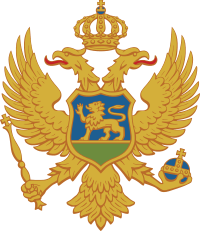Parliament of Montenegro
| Parliament of Montenegro Skupština Crne Gore Скупштина Црне Горе | |
|---|---|
 | |
| Type | |
| Type | |
| Leadership | |
| Structure | |
| Seats | 81 |
 | |
Political groups |
Independent: 11 |
| Elections | |
| Elections in Montenegro | |
Last election | 14 October 2012 |
| Meeting place | |
|
House of the Assembly Boulevard of Saint Peter of Cetinje 10 Podgorica | |
| Website | |
| http://www.skupstina.me | |
 |
| This article is part of a series on the politics and government of Montenegro |
| Constitution |
|
Legislative |
|
Judiciary
|
|
Executive |
|
|
Politics portal |
The Parliament of Montenegro (Montenegrin: Скупштина Црне Горе / Skupština Crne Gore) is the unicameral legislature of Montenegro. The Parliament currently has 81 members, each elected for a four-year term. The current Speaker of the Parliament is Ranko Krivokapić (SDP), while deputy speakers are Milutin Simović (DPS), Suljo Mustafić (BS) and Branko Radulović (DF). Following the 2006 independence referendum, the Parliament declared and ratified the independence of Montenegro on 3 June 2006. The system of the house is proportional representation.
History
Parliament of Montenegro has first been established by the Constitution of the Principality of Montenegro in 1905, under the name of Popular Assembly (Narodna skupština), under which it had limited legislative role, limited by the authority of Knjaz (Prince). The first convocation of the Parliament has been constituted in 1906.[1] Following the annexation of Kingdom of Montenegro into the Kingdom of Yugoslavia in 1918, the Parliament of Montenegro was disbanded until the World War II. The Parliament was reinstated in 1944, in the form of Montenegrin Antifascist Assembly of National Liberation (CASNO), which changed its name to Montenegrin National Assembly, and later National Assembly, lasting until 1946, when the new Assembly was elected in FR Montenegro, a constituent republic within SFR Yugoslavia. Current convocation is the 23rd since the foundation of the Parliament.
Powers
The Parliament appoints the Prime Minister nominated by the President, as well as the ministers chosen by the Prime Minister. Parliament also passes all laws in Montenegro, ratifies international treaties, appoints justices of all courts, adopts the budget and performs other duties as established by the Constitution. The Parliament can pass a vote of no-confidence in the Government with a majority of the members.
Deputies
A deputy has a four-year term. One deputy is elected per 6,000 voters, which in turn results in a change of total number of deputies in the parliament (the present assembly convening comprises 81 deputies instead of previous number of 74).
Last election
Parliamentary coalitions and parties
The ruling majority is formed by DPS, SD, PCG, LP, HGI, FORCA and DP.
| Parliamentary Clubs | Seats | Parties | Seats |
|---|---|---|---|
| Democratic Party of Socialists | 32 | Democratic Party of Socialists of Montenegro (DPS) | 32 |
| Democratic Front (DF) | 15 | ||
| New Serb Democracy (NOVA) | 7 | ||
| Movement for Changes (PzP) | 4 | ||
| Democratic People's Party (DNP) | 3 | ||
| Workers' Party (RP) | 1 | ||
| Independent | 11 | ||
| Democratic Alliance (DEMOS) | 4 | ||
| Democratic Montenegro | 2 | ||
| Social Democrats (SD) | 2 | ||
| United Reform Action (URA) | 1 | ||
| Movement for Pljevlja | 1 | ||
| Independent | 1 | ||
| Socialist People's Party | 7 | Socialist People's Party of Montenegro (SNP) | 7 |
| Social Democratic Party | 5 | Social Democratic Party of Montenegro (SDP) | 5 |
| Positive Montenegro | 4 | Positive Montenegro (PCG) | 4 |
| Albanian Parties (FORCA, AA), HGI and LP | 4 | ||
| FORCA | 1 | ||
| Albanian Alternative (AA) | 1 | ||
| Croatian Civic Initiative (HGI) | 1 | ||
| Liberal Party of Montenegro (LP) | 1 | ||
| Bosniak party | 3 | Bosniak Party (BS) | 3 |
See also
References
- ↑ http://www.skupstina.me/index.php/me/skupstina/o-nama/istorijat Parliament of Montenegro: History
External links
| ||||||||||||||||||||||||||||||||||||||||||||||
| ||||||||||||||||||||||